NewsBrief, 9-15 December 2014
- ECOWAS summit officially launches Common External Tariff
- CILSS identifies pockets of risk for food and nutrition insecurity
- ECOWAS Commission forecasts robust GDP growth in 2014 and 2015
- Ministers highlight progress on peace and democracy in 2014
- Opposition protesters take to the streets in Benin and Togo
- President Kafando outlines priorities as Burkina Faso marks national day
- Defence chiefs pledge military support for fight against Ebola
- RAAF: Call for proposals for social safety net projects
ECOWAS summit officially launches Common External Tariff
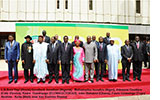 West African leaders marked a milestone in economic and political integration with the official launch of the ECOWAS Common External Tariff (CET) during their 46th regular summit on 15 December in Abuja. Addressing the heads of state and government, ECOWAS Commission President Kadré Désiré Ouédraogo said the CET will promote investment and industrialisation while shielding the agriculture sector and infant industries from unfair competition. "After nine years of continuous work, discussions, consultations and intra-community negotiations involving all stakeholders in our community, based on impact assessment studies conducted at the national and regional levels, our community has just achieve one of its main goals of integration", Ouédraogo said. Adopted by the heads of state in October 2013, the CET is set to enter into force on 1 January 2015, transforming the sub-region into a customs union. The upbeat tone carried through the rest of the summit, with the leaders lauding progress achieved in the area of political security as well as the solidarity shown in the regional response to the Ebola outbreak. In his welcome remarks, the Nigerian presidents noted the presence of Burkina Faso Interim President Michel Kafando, who was attending his first ECOWAS summit since taking the reins of the country's political transition following the popular uprising against long-time President Blaise Compaoré. Goodluck Jonathan said the recent events in Burkina Faso demonstrate the strides the region has made in strengthening political security. With five West African countries scheduled to hold elections in 2015, the heads of state stressed the need to continue efforts to consolidate democracy. "The heads of state and government reiterate their call on all the member states concerned for these elections to be conducted in a peaceful, free, fair and credible manner", they said in a final communiqué. The summit also addressed security challenges, including the continuing instability in northern Mali and Boko Haram's campaign of violence in north-eastern Nigeria. The leaders renewed the mandate of Ghanaian President John Mahama as Chairman of the Authority of ECOWAS Heads of State and Government.
West African leaders marked a milestone in economic and political integration with the official launch of the ECOWAS Common External Tariff (CET) during their 46th regular summit on 15 December in Abuja. Addressing the heads of state and government, ECOWAS Commission President Kadré Désiré Ouédraogo said the CET will promote investment and industrialisation while shielding the agriculture sector and infant industries from unfair competition. "After nine years of continuous work, discussions, consultations and intra-community negotiations involving all stakeholders in our community, based on impact assessment studies conducted at the national and regional levels, our community has just achieve one of its main goals of integration", Ouédraogo said. Adopted by the heads of state in October 2013, the CET is set to enter into force on 1 January 2015, transforming the sub-region into a customs union. The upbeat tone carried through the rest of the summit, with the leaders lauding progress achieved in the area of political security as well as the solidarity shown in the regional response to the Ebola outbreak. In his welcome remarks, the Nigerian presidents noted the presence of Burkina Faso Interim President Michel Kafando, who was attending his first ECOWAS summit since taking the reins of the country's political transition following the popular uprising against long-time President Blaise Compaoré. Goodluck Jonathan said the recent events in Burkina Faso demonstrate the strides the region has made in strengthening political security. With five West African countries scheduled to hold elections in 2015, the heads of state stressed the need to continue efforts to consolidate democracy. "The heads of state and government reiterate their call on all the member states concerned for these elections to be conducted in a peaceful, free, fair and credible manner", they said in a final communiqué. The summit also addressed security challenges, including the continuing instability in northern Mali and Boko Haram's campaign of violence in north-eastern Nigeria. The leaders renewed the mandate of Ghanaian President John Mahama as Chairman of the Authority of ECOWAS Heads of State and Government.
Final communiqué in English: http://news.ecowas.int/248&lang=en&annee=2014
Final communiqué in French: http://news.ecowas.int/248&lang=fr&annee=2014
CILSS identifies pockets of risk for food and nutrition insecurity
 Some areas of Chad, The Gambia, Guinea-Bissau and Senegal are facing crisis-level food insecurity, and many other parts of the Sahel and West Africa are under pressure. This is the conclusion from CILSS' most recent analysis under the Harmonised Framework (HF) for identifying areas and populations experiencing food and nutrition insecurity. The advisory, issued on 12 December, also looks ahead to conditions during the first quarter of 2015. "The situation could deteriorate by March 2015 if no intervention is implemented, particularly in Senegal, Mauritania, Burkina Faso, Niger and Chad," CILSS warns. Crop and livestock production was impacted by multiple dry spells early in the 2014-15 agricultural campaign. Insecurity in northern Mali and northeastern Nigeria has also put a strain on food and nutrition security by disrupting livelihoods, trade and pastoral routes. Rainfall deficits were most pronounced in the western part of the Sahel, and significant declines in production are expected in The Gambia, Mauritania and Senegal. Elsewhere, CILSS forecast "fair to good" agricultural production levels. "Overall, markets are well supplied and food prices for both grain for cash crops are lower than last year in the same period, but similar to the average of the last five years", CILSS said.
Some areas of Chad, The Gambia, Guinea-Bissau and Senegal are facing crisis-level food insecurity, and many other parts of the Sahel and West Africa are under pressure. This is the conclusion from CILSS' most recent analysis under the Harmonised Framework (HF) for identifying areas and populations experiencing food and nutrition insecurity. The advisory, issued on 12 December, also looks ahead to conditions during the first quarter of 2015. "The situation could deteriorate by March 2015 if no intervention is implemented, particularly in Senegal, Mauritania, Burkina Faso, Niger and Chad," CILSS warns. Crop and livestock production was impacted by multiple dry spells early in the 2014-15 agricultural campaign. Insecurity in northern Mali and northeastern Nigeria has also put a strain on food and nutrition security by disrupting livelihoods, trade and pastoral routes. Rainfall deficits were most pronounced in the western part of the Sahel, and significant declines in production are expected in The Gambia, Mauritania and Senegal. Elsewhere, CILSS forecast "fair to good" agricultural production levels. "Overall, markets are well supplied and food prices for both grain for cash crops are lower than last year in the same period, but similar to the average of the last five years", CILSS said.
Article in French: https://www.cilss.bf/spip.php?article475
Advisory in French: https://www.cilss.bf/CH_VF_121214_VF.pdf
ECOWAS Commission forecasts robust GDP growth in 2014 and 2015
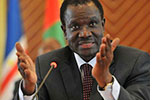 The ECOWAS Commission revealed strong economic growth forecasts for the West Africa region in 2014 and 2015. Commission President Kadré Désiré Ouédraogo announced the figures in his annual report to the Council of Ministers. "The ECOWAS region continues to be Africa's most dynamic Regional Economic Community with an expected growth rate of 6.3% in 2014," the President said. Côte d'Ivoire is expected to record 9.1% GDP growth, the highest in the sub-region. Economic activity is expected to accelerate further in 2015, registering a GDP growth rate of 7.1%. The Commission president said the robust growth figures will be achieved despite the impact of the Ebola outbreak, which has wreaked economic havoc in the three most affected countries and dealt a blow to the tourism industry across the region. Growth projections have been revised downward in Guinea, Liberia and Sierra Leone. "It cannot be overemphasised that socio-economic set-backs in the three most endemic countries affect the entire ECOWAS region as well," said Hanna Serwaa Tetteh, the chairwoman of the Council of Ministers. Realising the economic growth forecasts for 2015 will depend on bringing the outbreak under control by the end of 2014, Tetteh said.
The ECOWAS Commission revealed strong economic growth forecasts for the West Africa region in 2014 and 2015. Commission President Kadré Désiré Ouédraogo announced the figures in his annual report to the Council of Ministers. "The ECOWAS region continues to be Africa's most dynamic Regional Economic Community with an expected growth rate of 6.3% in 2014," the President said. Côte d'Ivoire is expected to record 9.1% GDP growth, the highest in the sub-region. Economic activity is expected to accelerate further in 2015, registering a GDP growth rate of 7.1%. The Commission president said the robust growth figures will be achieved despite the impact of the Ebola outbreak, which has wreaked economic havoc in the three most affected countries and dealt a blow to the tourism industry across the region. Growth projections have been revised downward in Guinea, Liberia and Sierra Leone. "It cannot be overemphasised that socio-economic set-backs in the three most endemic countries affect the entire ECOWAS region as well," said Hanna Serwaa Tetteh, the chairwoman of the Council of Ministers. Realising the economic growth forecasts for 2015 will depend on bringing the outbreak under control by the end of 2014, Tetteh said.
Article in English: http://www.panapress.com/14898-26-lang2-index.html
Article in French: http://www.afriquejet.com/dynamique-cedeao.html
Ministers highlight progress on peace and democracy in 2014
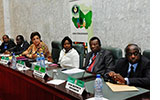 Ministers in charge of finance and regional integration welcomed strides made in promoting peace and democracy over the past year and looked ahead to 2015. The 73rd Ordinary Session of the ECOWAS Council of Ministers was held from 9 to 11 December in Abuja. Speaking at the opening session, Ghanaian Minister of Foreign Affairs and Regional Integration Hanna Serwaa Tetteh commended the legislative and presidential elections that restored constitutional order in Guinea-Bissau. "Significant progress has been made at the political level in the sub-region since the beginning of 2014 in addressing the political and security challenges," said Tetteh, the current Chairwoman of the Council of Ministers. Also addressing the meeting, ECOWAS Commission President Kadré Désiré Ouédraogo praised the solidarity member states have demonstrated this year, particularly with respect to the Ebola outbreak and the popular uprising in Burkina Faso. Looking ahead to 2015, Tetteh and Ouédraogo said the regional organisation and its member countries must continue to support Burkina Faso and Guinea-Bissau in order to consolidate democracy and stability. Ouédraogo noted that 2015 will be a year of "symbolic importance" with ECOWAS marking its 40th year of existence. He said the anniversary celebrations will pay tribute to the organisation's founding fathers while working to raise awareness of current integration measures and challenges. "We will equally plan activities liable to enable the Community to accelerate and make sure that West Africa's march towards its effective integration becomes irreversible", he said. "In other words, we intend to make the 40th anniversary celebration a watershed in the history of ECOWAS."
Ministers in charge of finance and regional integration welcomed strides made in promoting peace and democracy over the past year and looked ahead to 2015. The 73rd Ordinary Session of the ECOWAS Council of Ministers was held from 9 to 11 December in Abuja. Speaking at the opening session, Ghanaian Minister of Foreign Affairs and Regional Integration Hanna Serwaa Tetteh commended the legislative and presidential elections that restored constitutional order in Guinea-Bissau. "Significant progress has been made at the political level in the sub-region since the beginning of 2014 in addressing the political and security challenges," said Tetteh, the current Chairwoman of the Council of Ministers. Also addressing the meeting, ECOWAS Commission President Kadré Désiré Ouédraogo praised the solidarity member states have demonstrated this year, particularly with respect to the Ebola outbreak and the popular uprising in Burkina Faso. Looking ahead to 2015, Tetteh and Ouédraogo said the regional organisation and its member countries must continue to support Burkina Faso and Guinea-Bissau in order to consolidate democracy and stability. Ouédraogo noted that 2015 will be a year of "symbolic importance" with ECOWAS marking its 40th year of existence. He said the anniversary celebrations will pay tribute to the organisation's founding fathers while working to raise awareness of current integration measures and challenges. "We will equally plan activities liable to enable the Community to accelerate and make sure that West Africa's march towards its effective integration becomes irreversible", he said. "In other words, we intend to make the 40th anniversary celebration a watershed in the history of ECOWAS."
Article in English: http://news.ecowas.int/238&lang=en&annee=2014
Article in French: http://news.ecowas.int/238&lang=fr&annee=2014
Opposition protesters take to the streets in Benin and Togo
 Protesters in Togo called for presidential term limits, while opposition supporters in Benin demanded the government set a date for local elections. Thousands of people took part in demonstrations on 12 December in Lomé. It was the latest in a series of protests organised by the opposition National Alliance for Change (NAC) to demand constitutional reforms ahead of general elections scheduled for 2015. Police fired tear gas and water cannons to disperse the protesters as they approached the National Assembly in defiance of a presidential order against marching on the parliament. Opposition parties are seeking to limit the number of mandates a president can serve to prevent President Faure Gnassingbe from seeking a third term. Gnassingbe's family has ruled the country for nearly five decades. Term limits were eliminated in 2002, allowing his father to extend his rule. President Gnassingbe was installed by the military following his father's death in 2005 and has since won two disputed elections. Meanwhile in Benin, tens of thousands of protesters took to the streets in Porto-Novo and Cotonou to demand a timetable for municipal elections that have been delayed multiple times. Initially scheduled for March 2013, the elections were postponed due to problems with voter registration lists. Tensions over the election delay are heightened by oppositions suspicions that President Boni Yayi has designs to alter the constitution to allow him to seek a third term in 2016.
Protesters in Togo called for presidential term limits, while opposition supporters in Benin demanded the government set a date for local elections. Thousands of people took part in demonstrations on 12 December in Lomé. It was the latest in a series of protests organised by the opposition National Alliance for Change (NAC) to demand constitutional reforms ahead of general elections scheduled for 2015. Police fired tear gas and water cannons to disperse the protesters as they approached the National Assembly in defiance of a presidential order against marching on the parliament. Opposition parties are seeking to limit the number of mandates a president can serve to prevent President Faure Gnassingbe from seeking a third term. Gnassingbe's family has ruled the country for nearly five decades. Term limits were eliminated in 2002, allowing his father to extend his rule. President Gnassingbe was installed by the military following his father's death in 2005 and has since won two disputed elections. Meanwhile in Benin, tens of thousands of protesters took to the streets in Porto-Novo and Cotonou to demand a timetable for municipal elections that have been delayed multiple times. Initially scheduled for March 2013, the elections were postponed due to problems with voter registration lists. Tensions over the election delay are heightened by oppositions suspicions that President Boni Yayi has designs to alter the constitution to allow him to seek a third term in 2016.
Article in English: http://ghana-insider.com/gnassigbe-dynasty/
Article in English: http://www.huffingtonpost.com/world&ir=world
Article in French: http://www.rfi.fr/anc-ameganvi-fabre-sokode/
Article in French: http://news.acotonou.com/h/36616.html
President Kafando outlines priorities as Burkina Faso marks national day
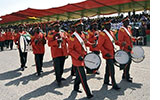 Burkina Faso Interim President Michel Kafando said the country will soon convene a national conference on justice. Speaking at an event to mark the 54th anniversary of the country's independence on 11 December, the transitional leader acknowledged the need to rebuild trust in the justice system and in democratic institutions. Kafando said the national day observation was a reminder of the need for all Burkina Faso citizens to participate in the nation-building effort. "After the shocking events our country has been through recently, we now realise how important it is for our beloved Burkina Faso and for every one of us and the up-and-coming generation to remain united and show solidarity", he said. Kafando stressed that the primary focus of the interim government is to organise free and transparent elections to restore democratic rule within a year. "If we can be assured of your trust and devotion as you have fully demonstrated so far, the transition is sure to tackle the challenges ahead and realise the assigned objective on time", he said. Despite a weighty domestic agenda, Kafando said Burkina Faso will continue to support peace negotiations in Mali. Ousted Burkina Faso President Blaise Compaoré had been the chief regional mediator in talks between the Malian government and armed factions in the north.
Burkina Faso Interim President Michel Kafando said the country will soon convene a national conference on justice. Speaking at an event to mark the 54th anniversary of the country's independence on 11 December, the transitional leader acknowledged the need to rebuild trust in the justice system and in democratic institutions. Kafando said the national day observation was a reminder of the need for all Burkina Faso citizens to participate in the nation-building effort. "After the shocking events our country has been through recently, we now realise how important it is for our beloved Burkina Faso and for every one of us and the up-and-coming generation to remain united and show solidarity", he said. Kafando stressed that the primary focus of the interim government is to organise free and transparent elections to restore democratic rule within a year. "If we can be assured of your trust and devotion as you have fully demonstrated so far, the transition is sure to tackle the challenges ahead and realise the assigned objective on time", he said. Despite a weighty domestic agenda, Kafando said Burkina Faso will continue to support peace negotiations in Mali. Ousted Burkina Faso President Blaise Compaoré had been the chief regional mediator in talks between the Malian government and armed factions in the north.
Article in English: http://en.starafrica.com/bfaso-justice-soon.html
Article in French: http://fr.starafrica.com/burkina-faso-president.html
Defence chiefs pledge military support for fight against Ebola
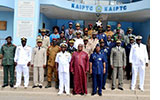 West African countries will deploy 192 military medical personnel to strengthen the fight to contain the Ebola outbreak in the region. The announcement came at an extraordinary meeting of the ECOWAS Committee of Chiefs of Defence Staff (CCDS), held on 8 December in Accra. The meeting was a response a directive from heads of state and government calling for member states to provide military assistance with the aim of enhancing response capabilities, supporting medical teams and aiding in the construction of additional treatment centres. Underscoring the importance of regional responses, Liberia hosted a conference on cross-border co-operation to bring the outbreak under control. Organised by the Liberian government in collaboration with the United Nations Mission for the Ebola Emergency Response (UNMEER), the meeting brought together the leaders of national response teams from seven countries. The latest figures from the WHO show the virus has killed more than 6 300 people and infected 18 000, the vast majority of them in Guinea, Liberia and Sierra Leone. With Guinea and Liberia registering progress in reducing transmissions in recent weeks, the UN now says Sierra Leone has become the "area of concern". Following a visit to Freetown on 11-12 December, UNMEER chief Anthony Banbury called for a "surge" in efforts to combat a spike in transmission rates in Sierra Leone.
West African countries will deploy 192 military medical personnel to strengthen the fight to contain the Ebola outbreak in the region. The announcement came at an extraordinary meeting of the ECOWAS Committee of Chiefs of Defence Staff (CCDS), held on 8 December in Accra. The meeting was a response a directive from heads of state and government calling for member states to provide military assistance with the aim of enhancing response capabilities, supporting medical teams and aiding in the construction of additional treatment centres. Underscoring the importance of regional responses, Liberia hosted a conference on cross-border co-operation to bring the outbreak under control. Organised by the Liberian government in collaboration with the United Nations Mission for the Ebola Emergency Response (UNMEER), the meeting brought together the leaders of national response teams from seven countries. The latest figures from the WHO show the virus has killed more than 6 300 people and infected 18 000, the vast majority of them in Guinea, Liberia and Sierra Leone. With Guinea and Liberia registering progress in reducing transmissions in recent weeks, the UN now says Sierra Leone has become the "area of concern". Following a visit to Freetown on 11-12 December, UNMEER chief Anthony Banbury called for a "surge" in efforts to combat a spike in transmission rates in Sierra Leone.
Article in English: http://www.ghanaweb.com/artikel.php?ID=338498
Article in English: http://www.un.org/NewsID=49599#.VI4Y-ktHHLS
Article in French: http://www.un.org/storyF.asp?NewsID=33875
RAAF: Call for proposals for social safety net projects
 ECOWAS, through the Regional Agency for Agriculture and Food (RAAF), based in Lomé, and with the financial support of the Spanish Agency for International Development Co-operation (AECID), intends to fund "innovative" projects related to social safety nets in West Africa. These projects will be implemented by non-state actors, non-profits, international, national and local NGOs, federations, associations and organisations of producers, pastoralists, agro-pastoralists and agroindustry, associations of rural women as well as by local authorities. The amount of this call for proposals is USD 2.2 million. The complete file will be available from 20, January 2015 at www.araa-raaf.org. The deadline for sending (by email and by post) project proposals is 20 March 2015.
ECOWAS, through the Regional Agency for Agriculture and Food (RAAF), based in Lomé, and with the financial support of the Spanish Agency for International Development Co-operation (AECID), intends to fund "innovative" projects related to social safety nets in West Africa. These projects will be implemented by non-state actors, non-profits, international, national and local NGOs, federations, associations and organisations of producers, pastoralists, agro-pastoralists and agroindustry, associations of rural women as well as by local authorities. The amount of this call for proposals is USD 2.2 million. The complete file will be available from 20, January 2015 at www.araa-raaf.org. The deadline for sending (by email and by post) project proposals is 20 March 2015.
More info in English: http://araa-raaf.org/announcement.html
More info in French: http://araa-raaf.org/fr/annonce.html
| Attachment | Size |
|---|---|
| 194SWACNewsBrief9-15Dec2014_en.pdf | 1.48 MB |
